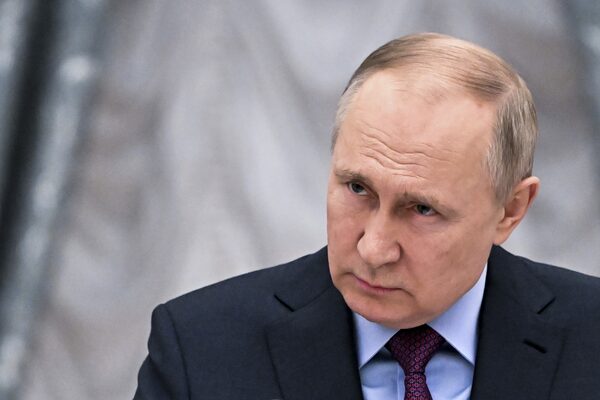
Russian President Vladimir Putin speaks during a news conference in Moscow, Russia, on Feb. 22.Mikhail Klimentyev/The Associated Press
Amy Knight is the author of Orders To Kill: The Putin Regime and Political Murder.
As the Russian invasion of Ukraine proceeds with breathtaking pace, a key question is how much support Vladimir Putin can count on at home.
On the surface, it appears that the Russian President has the firm backing of the Kremlin elite, composed mainly of bona fide hard-liners who have enthusiastically endorsed his claim that Russia had no choice but to defend itself against the “Nazi, genocidal” government of Ukraine. And given that Mr. Putin’s popularity surged after Russia invaded Crimea in 2014, many expect that ordinary Russians, known for their patriotism, will again rally around their leader.
But Mr. Putin may have actually set himself up for potential challenges to his leadership. As Russian political commentator Andrei Piontkovsky tweeted: “The paradox of this war for Russia is that the greater its ‘military successes,’ the more catastrophic its political results will be.”
On Feb. 21, just before the invasion began, a remarkable meeting of Mr. Putin’s National Security Council exposed tensions between the Russian leader and members of his inner circle. It was televised, which was highly unusual: Apparently, Mr. Putin wanted his minions to share the responsibility publicly for his bold move, which he knew would arouse international condemnation. But it was also odd that there was considerable reluctance to endorse his proposal to recognize the independence of Donetsk and Luhansk, which would justify Russian military intervention in the Donbas as “peacekeeping” and pave the way for a full-scale invasion of Ukraine. Although Mr. Putin’s men are hardly foreign-policy doves, some of them are apparently more realistic than their boss.
The UN and NATO have failed Ukraine. But it’s not too late for them to step up now
Might does not make right: Russia’s unjust war is doomed to fail
At the meeting, Foreign Affairs Minister Sergei Lavrov reminded the President that Mr. Putin had stressed how the Ukrainian crisis depended on Russia’s relations with the U.S. and other Western countries. Instead of endorsing Mr. Putin’s proposal, Mr. Lavrov requested permission to meet in Geneva with U.S. Secretary of State Antony Blinken on Feb. 24. “We need to understand what the Americans have in mind,” Mr. Lavrov said. Security Council chief Nikolai Patrushev and Prime Minister Mikhail Mishustin both added that Russia should explore Mr. Lavrov’s suggested diplomatic options before moving to recognize the Donbas republics.
The most remarkable exchange came when foreign intelligence chief Sergei Naryshkin was called upon to speak. Mr. Naryshkin, who studied with Mr. Putin at the KGB Red Banner School, has strong anti-Western credentials. But he, too, agreed, saying that “our Western partners should be given the last chance in order to ask them to force Kyiv to make peace and comply with the Minsk agreements as soon as possible. Otherwise, we must take the decision that is being discussed today.”
Clearly irritated, Mr. Putin snapped: “What does ‘otherwise’ mean? Do you propose starting a negotiation process or recognizing the sovereignty of the republics? Speak straight.” After more angry chiding from Mr. Putin, a visibly uncomfortable Mr. Naryshkin finally said, “I support the proposal to recognize independence.” Then, Mr. Putin ordered him to sit down.
The Security Council session called to mind a 1952 meeting of Joseph Stalin’s Politburo, during which the paranoid Stalin discussed his intended military confrontation with the West. According to the minutes, he chastised his subordinates for their lack of enthusiasm: ‘’Here, look at you – blind men, kittens. You don’t see the enemy. What will you do without me?” Just a few months after the meeting, Stalin died; theories persist that his outwardly loyal henchmen poisoned him.
Western sanctions must be causing Mr. Putin’s men a lot of anxiety. They have doubtless safeguarded their money in offshore accounts, and they may not care if they have to spend the rest of their lives in their own country, vacationing on the Black Sea instead of the Mediterranean – but what if their families are sanctioned? Do they want their children and grandchildren confined to Russia’s golden cage, without access to the Western world?
Mr. Putin’s team no doubt also fears that the Russian people will not respond to war in Ukraine as positively as the President expects, especially if there are significant Russian casualties. Such concerns seem justified: As of Sunday, more than 3,000 people have been arrested during protests in cities all over Russia. Although Roskomnadzor, Russia’s media watchdog, has instructed the media to use only information from official government sources in covering the conflict, the truth is getting out.
With Russian troops moving in on Kyiv, much depends on Ukrainian resistance, the response of the West and the extremes to which Russia goes in asserting its domination of Ukraine by force. But whatever Russia’s military successes, other battles may be awaiting Mr. Putin at home.
Keep your Opinions sharp and informed. Get the Opinion newsletter. Sign up today.